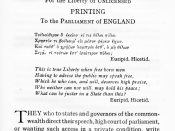In Milton's sonnet he strongly conveys his introspective nature. Through this
personal battle of physical ineptness verses pleasing God, only one solution is to be
discovered. Milton uses the metaphor light to give the reader a visual image of the nature
of light. When any light is spent it is useless. The same uselessness of a burnt-out light
is what Milton conveys himself as being without eyesight. In lines 2,3 Milton uses the
word talent to subtly hint at the parable described in the bible. In this parable a talent is a
form of currency, and to be unproductive with it is displeasing to God. Another reference
to the parable appears in line 3, "which is death to hide" implies that not being productive
will result in God's unprejudiced judgment. Throughout lines 4-6 Milton describes his
predicament of having a gift to please God with, but not being able to use it due to his
blindness. Specifically in line 4 he uses the word lodged to describe a situation in which
one has something great that seems somewhat inherited or obtained without effort. In
this same line he also presents his introspectiveness through revealing his internal pain,
"though my soul more bent." Line 5 ties into the beginning of line 4 completely
describing how he would use his talent to serve his maker or God. It seems as if the last
half of line 4 doesn't belong or flow. Milton describes, in this odd placement, that
despite everything his emotions are bound with fear and confusion, however continuing
to line 5 he picks back up with his works. I believe this seemingly non-linear placement
is to specifically emphasize what great torment really resides inside. Milton once again
uses a tactfully placed adjective, "true", to represent that...


